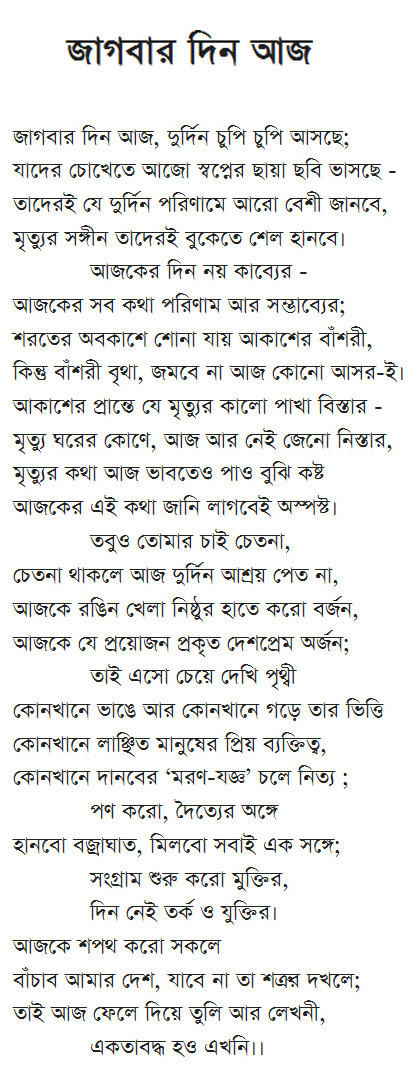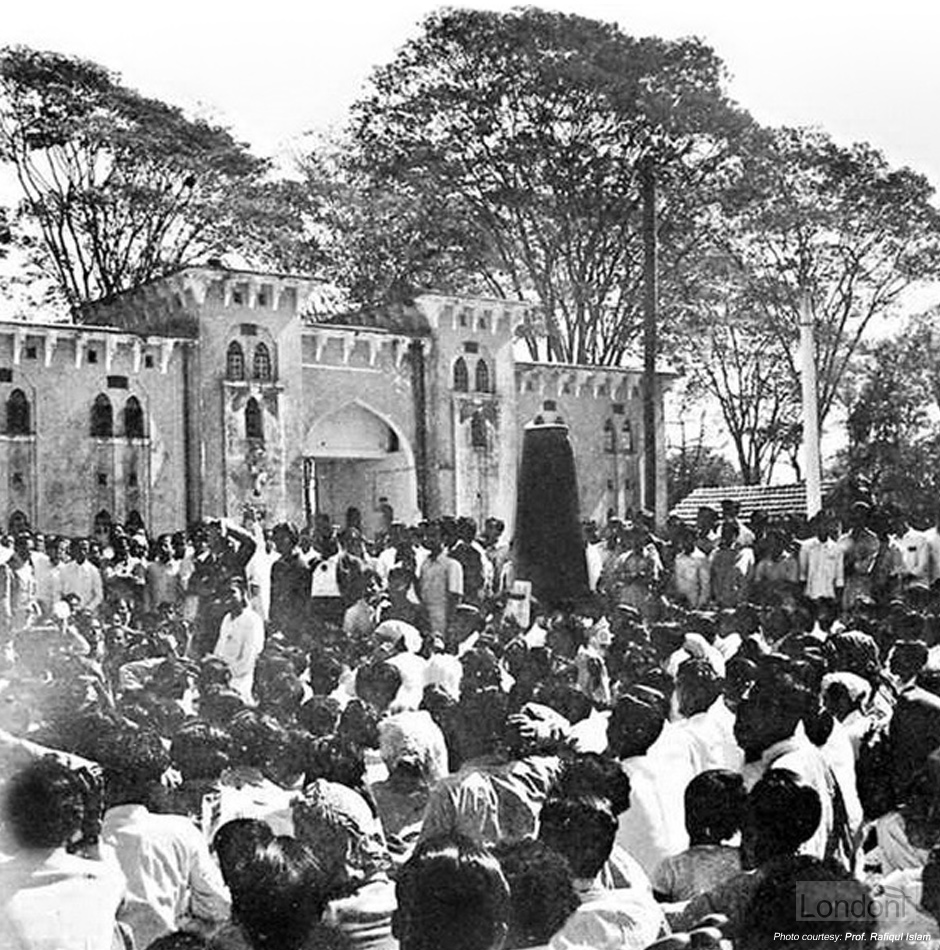
The battle for Bangla begins
Last updated: 5 October 2017 From the section 1952 Bhasha Andolon
Throughout February the Shorbodolio Kendrio Rashtrobhasha Kormi Porishod held protest meetings.
Students strike on 4 February 1952
On 4 February 1952, around 11 O'clock in the morning, a huge number of students from Dhaka University and other institutions gathered on the university premises. Presided by Gaziul Haq, the students contemplated demonstrating in the city against the language issue. At one point, Abdul Matin, convenor of Dhaka University State Language Committee, intervened to ask the students if they were willing to go for a demonstration. The answer was a resounding 'Yes'. Soon a procession of young students were led by Gaziul Haq and Abdul Matin through Nawabpur Road, Dhaka, and passed by official homes of the vice chancellor and the chief minister. They warned the government to withdraw its proposal to write Bengali in Arabic script, and insisted on the recognition of Bengali.
This strike on 4th February was also observed in other towns and cities such as Chittagong, Mymensingh, Comilla and Narayanganj.
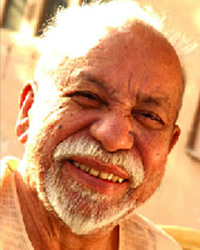 Gaziul Huq (1929 - 2009) A Basha Shoinik (language activist) and a renowned student leader during the Bengali Language Movement. Chaired the meeting at Amtola, Dhaka University (DU) premises on Ekushey February from which the decision to violate Section 144 was made. Passed matriculation from Bogra Zilla School (1946). Obtained bachelor’s degree (1951) and master's degree (1952) in history from DU and took his LLB degree (1956) from DU also. Expelled from University for student politics on 14 April 1953 and his M. A. degree was suspended. Later his degree was restored and suspension was lifted due to student procession. Received honorary degree of 'Doctor of Literature' from DU in 2008 in it's 44th convocation. Professionally, a senior lawyer at Supreme Court of Bangladesh. Wrote books such as Jeler Kabita (1959), Ebarer Sangram Swadhinatar Sangram (1971), Bangladesh Unchained (1971), Mohammad Sultan (1994) and Media Laws and Regulations in Bangladesh (1992). Fell unconscious in his house at Purba Hazipara of Sabujhbagh, Dhaka, after suffering from long-term illness (brain hemorrhage in 2001, resulting in memory loss and dumbness) and died in Square Hospital. Born in village of Nishchintopur, Chagolnaia Thana in Noakhali district. Buried in family graveyard at Sultanganj Para in Bogra.
Gaziul Huq (1929 - 2009) A Basha Shoinik (language activist) and a renowned student leader during the Bengali Language Movement. Chaired the meeting at Amtola, Dhaka University (DU) premises on Ekushey February from which the decision to violate Section 144 was made. Passed matriculation from Bogra Zilla School (1946). Obtained bachelor’s degree (1951) and master's degree (1952) in history from DU and took his LLB degree (1956) from DU also. Expelled from University for student politics on 14 April 1953 and his M. A. degree was suspended. Later his degree was restored and suspension was lifted due to student procession. Received honorary degree of 'Doctor of Literature' from DU in 2008 in it's 44th convocation. Professionally, a senior lawyer at Supreme Court of Bangladesh. Wrote books such as Jeler Kabita (1959), Ebarer Sangram Swadhinatar Sangram (1971), Bangladesh Unchained (1971), Mohammad Sultan (1994) and Media Laws and Regulations in Bangladesh (1992). Fell unconscious in his house at Purba Hazipara of Sabujhbagh, Dhaka, after suffering from long-term illness (brain hemorrhage in 2001, resulting in memory loss and dumbness) and died in Square Hospital. Born in village of Nishchintopur, Chagolnaia Thana in Noakhali district. Buried in family graveyard at Sultanganj Para in Bogra.
"Jagbar Din Aaj" by Sukanta Bhattacharya
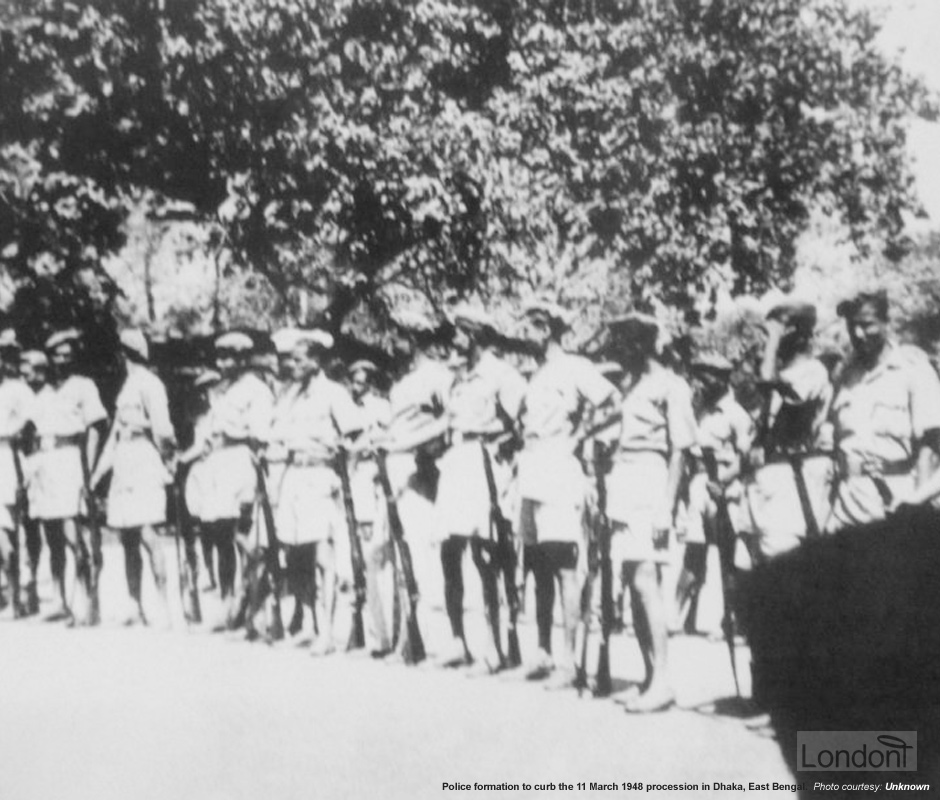
Section 144
The East Bengal Legislative Assembly met in the afternoon of 20 February 1952. Of a total of 123 members of the assembly, 80 were present in the House. As soon as the session began, Khairat Hossain - an Awami Muslim League opposition leader from Nilphamari, Rangpur Division - demanded a discussion on the ban imposed on the Pakistan Observer newspaper a week earlier (13 February 1952) for supporting the Bangla language movement. This move was swiftly opposed by Chief Minister Nurul Amin who had informed the Assembly that the step had been necessitated 'in the public interest' as the newspaper was accused of causing provocation on the language issue. Thus, the motion was not allowed by the speaker and no further discussion could take place on the matter.
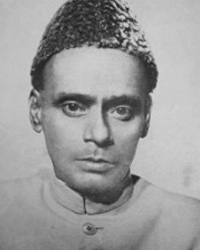 Khairat Hossain ()
Khairat Hossain ()
Around 5 o'clock in the afternoon, as preparations for the 21st February demonstrations were underway, the Muslim League government suddenly imposed Section 144 of the Criminal Procedure Code in the city of Dhaka for 30 days. This meant there was a ban on processions, demonstrations and gatherings of more than four people in any public place or thoroughfare in the city. The orders were served by the District Magistrate of Dhaka, S. H. Qureshi. He was a new Magistrate of limited experience who had only assumed charge as District Magistrate the day before, and was thrown into the deep end of announcing it to the general public and fulfilling the orders successfully. District Magistrate Qureshi feared that there might be a breach of peace and disturbance of public tranquility in the city which would jeopardise the East Bengal Legislative Assembly's session scheduled to be held the next day (i.e. 21 February 1952) along with the meeting arranged by the Provincial Muslim League Council on the same day.
The order was promulgated [announced to the public] by beat of drum throughout the city; a publicity van broadcast it through the microphones and copies were given to the various newspapers [to be issued on the morning of the next day, i.e. 21 February 1952]. Police arrangements were made to meet the expect emergency and by 7:30 a.m. on the 21st of February, 1952, the Control Room was manned and dispositions were, made of the Police forces accordance with these arrangements.
Government officials were quick to justify the imposition of Section 144. Among them was Aziz Ahmed, chief secretary to the government of East Bengal, who pointed out that intelligence reports had warned of plans by the protestors to surround the assembly premises and enter the House forcibly. Reality was much different. The students of Dhaka University as well as the general public had done nothing that could be construed as violent in intent or nature. Clearly the growing momentum to establish Bangla as a state language had unnerved the government.
The fact was that though the protestors did plan to lay siege to the assembly they did not mean to enter it. The government was simply resorting to falsehood in order to clamp Section 144 on the capital as a way of preventing any public show of protest on the language issue.
Most interestingly, it was Chief Minister Nurul Amin who put his own government in an embarrassing situation. He noted subsequently that the decision to impose Section 144 had been made at the official, meaning bureaucratic, level and he had not been consulted on the subject. Amin's statement is a broad hint of how politicians in power at the time were hostage to their officials, in other words, those who were supposed to take orders from them. Chief Secretary Aziz Ahmed ran the province with no thought to the authority of the chief minister
Syed Badrul Ahsan, Journalist
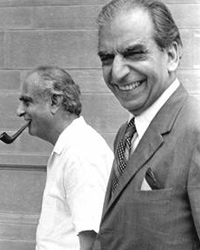 Aziz Ahmed ()
Aziz Ahmed ()  S. H. Qureshi ()
S. H. Qureshi ()
Shorbodolio Kendrio Rashtrobhasha Kormi Porishod back out from hartal
The government's action quickly led to rethinking on the part of the Shorbodolio Kendrio Rashtrobhasha Kormi Porishod. That evening after Section 144 was announced, the Action Committee met at the premises of the Awami League office in an emergency meeting under the chairmanship of Abul Hashim since Maulana Bhasani was at Tangail and Sheikh Mujib was jailed.
They met to decide the strategy about the strike but opinion was divided about the violation of Section 144. With the upcoming General Election in mind and unaware of the tragic violent outcome that was to follow, an overwhelming 20 out of the 24 leaders (in other literature this is quoted as 11 out of the 16 leaders) decided against violating Section 144 and planned to call off the strike for the next day.
However, in that meeting it was further decided that Shamsul Huq, General Secretary of Awami Muslim League would go to Dhaka University to discuss the matter with the student leaders and convince them to restrain from breaking Section 144.
A major factor that appeared to have guided the Action Committee into its new move was the view of those present that a violation of the restraining orders could lead to a delay in the holding of provincial elections, something that was expected to be held sooner rather than later.
It may be noted that elections to the East Bengal Legislative Assembly had repeatedly been delayed on one pretext or another. The provincial government, fearing a rout at the polls, was not willing to call elections only to lose office. The Action Committee was therefore reluctant to give the government any more chance of keeping the elections at bay.
Most of the leaders on the night of February 20th returned home with the confidence of the decision not to violate the restriction imposed section 144.
Amor Ekushe website
The move to call off the strike was, however, strongly opposed by the students and student leaders of Dhaka University, Dhaka Medical College and Engineering College. The student body was not intimidated by Section 144. They accepted the challenge. They refused to compromise with their marti bhasha Bangla and were determined to hold a protest meeting on 21st February at the University campus.
Tempers ran high, so much so that eventually the Action Committee decided that the next day, 21 February 1952, the option of whether the strike would go ahead or would be called off would be left to the students. The moment of decision was thus at hand.
Students gather at Amtala and draw blueprint for protest
On 19 February 1952 students gathered under the leadership of Zillur Rahman, current President of Bangladesh, in the historic Amtala (Mango grove) of Dhaka University demanding Bangla as the state language. The work plan of 21 February was taken from here.
The following day (20 February 1952), having rejected the Language Action Committee’s plea not to go ahead with the 21st February demonstration, 11 student leaders met at the pond-side between Fazlul Huq Hall and Dhaka Hall of Dhaka University and took a firm decision to violate section 144 - even if it came at the cost of their lives.
Amongst the student leaders that were present at that meeting were:
- Comrade Md Sultan
- Late S. A. Bari A.T (Vice Prime Minister, BNP government later)
- Late Anowarul Haq Khan (Press Secretary of Mujibnagar Govt)
- Late Monjur Hossain (Doctor at Nawjaon)
- Retd. Habibur Rahman Shelley (Cheif Justice later)
- Zillur Rahman (Leader of Awami League Minister of Awami League Govt)
- Gaziul Haq (Renouned Lawyer, Dhaka High Court)
- Abdul Monin (Leader of Awami League and Food Minister of former Awami League government)
- M. R . Akhtar Mukul (Known as CHOROM POTRO of Sadhin Bengal Betar: Host of Bangladesh Radio during 1971 Liberation war)
- Syed Kamruddin Hossain Shohud (Professor, Dhaka University)
- Anwar Hossain (Present identity unknown)
During this meeting it was decided that Muhammad Habibur Rahman would lead the first batch of procession. And, in order to keep the blueprint of the rally confidential, Gaziul Huq and MD. Sultan wrote slips on cigarette packets requesting all students of Dhaka University to come to the university between 9.30 to 10.30 a.m.

